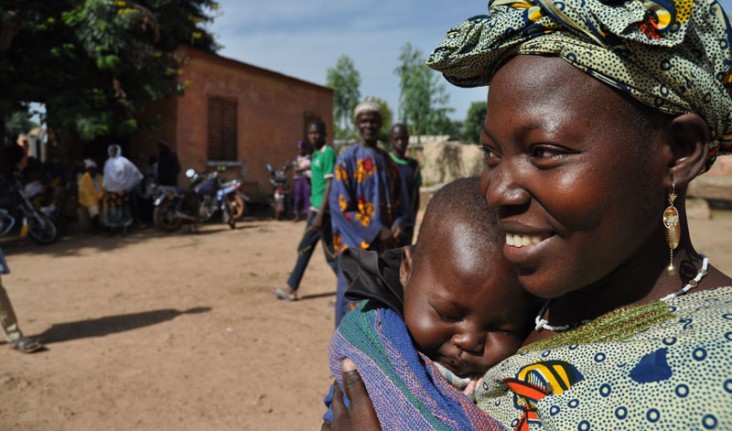- What We Do
- Agriculture and Food Security
- Democracy, Human Rights and Governance
- Economic Growth and Trade
- Education
- Ending Extreme Poverty
- Environment and Global Climate Change
- Gender Equality and Women's Empowerment
- Global Health
- Water and Sanitation
- Working in Crises and Conflict
- U.S. Global Development Lab

Worldwide, an estimated 214 million women would like to delay or limit childbearing but are not using any method of contraception. In many parts of the world, each pregnancy puts a woman’s life at risk, and the use of contraceptives has been shown to reduce maternal deaths by 44 percent. Healthy timing and spacing of pregnancies could avert 1.4 million child deaths each year in the U.S. Agency for International Development’s (USAID’s) priority countries.
USAID recognizes that expanding access to modern methods of contraception is critical to improving maternal and child health outcomes. In many settings, however, access is limited by social norms that discourage family planning, as well as limited access to information among women and their partners, and biases by healthcare providers toward certain client groups or contraceptive methods. For these reasons, increasing healthy timing and spacing of pregnancy through family planning requires not only provision of contraceptive commodities and quality health services, but also focused attention to social and behavior change.
USAID’s Office of Population and Reproductive Health has identified social and behavior change (SBC) as one of five technical focus areas to be emphasized in USAID-supported reproductive health programming. USAID’s work in SBC for reproductive health supports the goals of Family Planning 2020, an international coalition of stakeholders from multiple sectors dedicated to enabling 120 million more women and girls to use contraceptives by 2020. This work is grounded in principles of voluntarism, informed choice, gender equity, and support to young people, and has focused heavily on balancing application of proven practices with continued learning and innovation. Areas of particular emphasis include effective alignment between SBC and family planning services; provider behavior change; integration of reproductive health SBC with other health areas and development sectors; and community-centered SBC that seeks to promote engagement of men and women and foster positive social norms around family planning.
USAID supports a number of projects and initiatives that focus substantially on social and behavior change for reproductive health and family planning. These include:
- The Health Communication Capacity Collaborative (HC3). Through investments in HC3, a global flagship project for SBC3, USAID promotes family planning by creating practical tools to support the design and implementation of high quality SBC programming; convening global practitioners for knowledge exchange; and curating and disseminating programmatic examples and best practices. Through its family planning portfolio, HC3 focuses on improving the sexual and reproductive health of one of the world’s fastest-growing populations: urban youth; revitalizing conversation around healthy timing and spacing of pregnancies for high-risk groups like women of advanced maternal age, or those who have five children or more; strengthening the capacity of local organizations to identify and effectively address crucial family planning barriers in their countries; enhancing providers’ abilities to properly discuss and sensitively counsel clients on a range family planning methods; increasing the demand for and correct use of long-acting and reversible contraceptives; and increasing attention to gender norms and dynamics as an element of family planning.
- PHARE. A Task Order under USAID's TRANSFORM project, PHARE develops and tests innovative and evidence-based SBC practices that address persistent barriers to modern contraceptive use, transform attitudes about reproductive health, and promote family planning in West Africa. The project aims to increase demand for family planning products and services; enhance active support for family planning among key influencer groups; and address social norms to create a favorable environment for family planning. The project emphasizes approaches for effective audience segmentation and profiling; social network-based research and programming; provider behavior change; and integration of reproductive health SBC with activities in non-health sectors such as agriculture and environmental conservation.
- The Passages Project. As an implementation science project, Passages develops and evaluates community-centered SBC interventions that foster normative environments that enable young people, especially very young adolescents, newly married couples, and first time parents, to use modern family planning and achieve healthy timing of first and subsequent pregnancies through scalable programs. Passages bridges the gap between science and effective policy and practice by replicating and scaling up social norm interventions; strengthening in-country capacity to plan, implement, monitor, and evaluate the scale-up of effective pilot initiatives to address normative change; and distilling and sharing evidence and sparking dialogue on integration, measurement, and evaluation of normative interventions.
- Family Planning High Impact Practice Brief: Health Communication. A part of the USAID Family Planning High Impact Practices (HIP) series, the Health Communication brief explains the importance of social and behavior change (health communication) to enable individuals to make voluntary and informed healthcare decisions around family planning. The brief defines health communication, provides a summary of the evidence on the impact of family planning communication programs, and highlights some key elements of successful SBC interventions.
Additional Resources
USAID Family Planning activities
USAID’s Adolescent Sexual and Reproductive Health Programming Priorities
Urban Youth SRH Implementation Kit
Healthy Timing and Spacing of Pregnancy Implementation Kit
Tools for Promotion of Long Acting Reversible Contraception







Comment
Make a general inquiry or suggest an improvement.